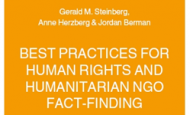Press Release:
NGO Monitor Hosts Book Launch for "Best Practices"
Former member of UN Missions Discusses Fact-Finding Challenges, Need for Dialogue
JERUSALEM – As a starting point for an important conversation on international fact-finding missions, NGO Monitor tonight hosted a book launch for Best Practices for Human Rights and Humanitarian NGO Fact-Finding (Nijhoff 2012). The event featured a keynote address by Prof. Francoise J. Hampson, a member of fact-finding missions to the former Yugoslavia and Lebanon, and a former member of the UN Sub-Commission on the Promotion and Protection of Human Rights. Prof. Hampson discussed the urgent need for a dialogue with non-governmental organizations (NGOs) and other bodies as they report in areas of conflict.
“We need to try and improve the quality of NGO reports by critiquing them when they are wrong,” said Prof. Hampson. “Show where an NGO misinterpreted international law or misreported facts on the ground so they can work to try and correct it. There also are steps NGOs themselves can take – for example, they should be expected to qualify statements when they are not 100 percent sure of their accuracy or when they have been rushed to judgment due to time constraints. These are very complicated issues that simple rules cannot necessarily fix.”
Prof. Hampson cited the Goldstone Report as an example where war crimes were alleged without qualifying that not all of the necessary information was known. She also noted that while she understands Israel’s frustration with international bodies – particularly with regards to the UN Human Rights Council – she would urge Israeli officials to cooperate with fact-finding missions and human rights mechanisms carrying out investigations, at least where they are not overtly political or one-sided.
Best Practices examines available resources and appropriate standards for international NGO fact-finding missions, and surveys proposed guidelines for human rights and humanitarian NGOs. Fact-finding methodologies used by major NGOs and international commissions were examined in five specific cases: Kosovo, Georgia, Democratic Republic of Congo, Colombia, and Lebanon 2006.
NGO Monitor’s Legal Advisor Anne Herzberg opened the event noting that the Best Practices book was meant to build on nearly 10 years of NGO Monitor Research. Alan Stephens, Director of Research at the Clemens Nathan Research Centre spoke about the impetus for developing the Lund-London Guidelines for NGO Fact-Finding in which he played an integral role, and introduced Prof. Hampson. Following Prof. Hampson’s address, a panel of international law experts, with experience on fact-finding mission, offered their perspective on the book and discussed problems they have seen due to a lack of existing guidelines. Panelists included: Dr. Rephael H. Ben-Ari, Bar Ilan University, Former Legal Advisor, Embassy of Israel in The Hague; Adv. Sigall Horovitz, Hebrew University, Former Legal Officer, Int’l Criminal Tribunal for Rwanda, Special Court for Sierra Leone; Col. Liron Libman, Former Head, International Law Department, Israel Defense Forces Military Advocate General’s Corps; Prof. Robbie Sabel, Hebrew University of Jerusalem Former Legal Advisor, Israel Ministry of Foreign Affairs.
Prof. Gerald Steinberg, president of NGO Monitor, moderated the discussion, noting, “NGOs have long enjoyed a ‘halo effect’, meaning that their claims are accepted at face-value by journalists, diplomats, and in international frameworks, such as the United Nations. In contrast, our research has documented repeated examples in which influential NGOs have published false reports and misrepresented international law, particularly regarding allegations of civilian deaths in conflict zones. Best Practices is an essential correction, and will push NGOs to report accurately on these complex issues. Had these principles been practiced by Human Rights Watch and Amnesty International, as well as by the UN in the Goldstone Report and other cases, major mistakes could have been avoided.”

